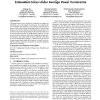732 search results - page 3 / 147 » Power minimization using control generated clocks |
ISLPED
2006
ACM
13 years 11 months ago
2006
ACM
—The thermal gradients existing in high-performance circuits may significantly affect their timing behavior, in particular, by increasing the skew of the clock net and/or alteri...
ICCAD
2005
IEEE
14 years 2 months ago
2005
IEEE
— Although the LUT (look-up table) size of FPGAs has been optimized for general applications, complicated designs may contain a large number of cascaded LUTs between flip-flops...
DAC
2005
ACM
13 years 7 months ago
2005
ACM
This paper presents a new method for designing test wrappers for embedded cores with multiple clock domains. By exploiting the use of multiple shift frequencies, the proposed meth...
DAC
2008
ACM
14 years 6 months ago
2008
ACM
This paper discusses the use of networks-on-chip (NoCs) consisting of multiple voltage-frequency islands to cope with power consumption, clock distribution and parameter variation...
FPGA
2006
ACM
13 years 8 months ago
2006
ACM
This paper examines the tradeoffs between flexibility, area, and power dissipation of programmable clock networks for FieldProgrammable Gate Arrays (FPGA's). The paper begins...

